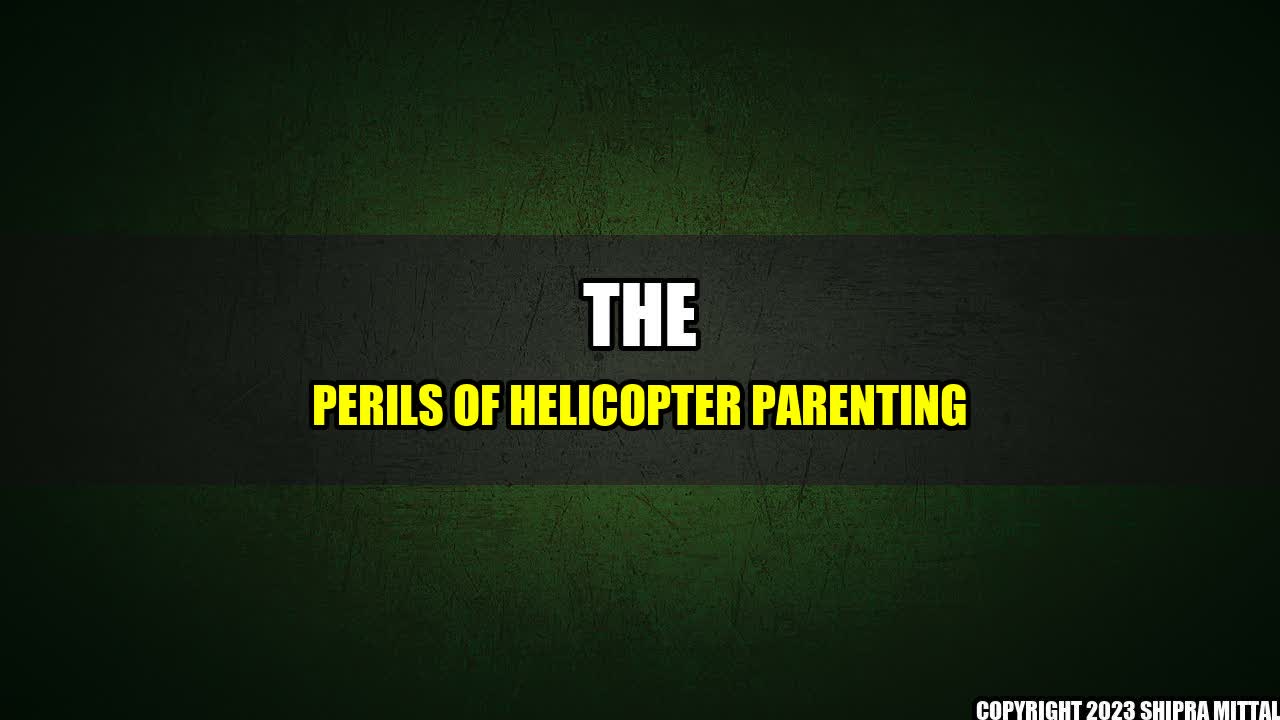Julie had always been an overprotective parent. From the moment her daughter was born, she had hovered over her, controlling every aspect of her life. She would micro-manage her daughter's homework, choose her friends, and make all her decisions for her. Julie had always believed that she was doing what was best for her child, but it wasn't until her daughter was heading off to college, that she realized the harm she was causing.
"I had sheltered my daughter so much that she didn't know how to handle things on her own. She had never had to make difficult choices, and she didn't have a sense of self-reliance. I wish I had been more hands-off, and let her make mistakes and learn from them."
Julie's story is all too familiar for parents who fall into the trap of 'helicopter parenting'. These are the parents who hover over their children, constantly monitoring their activities and micromanaging their lives. While this type of parenting stems from a place of love and concern, it can have detrimental effects on a child's development and growth into adulthood.
What is Helicopter Parenting?
Helicopter parenting, also known as overparenting or parental overinvolvement, is a style of parenting where the parent is excessively involved in their child's life. They tend to hover over their child, and become overly involved in their activities, academics, and personal lives. These parents often micromanage their child's decisions, and have a tendency to shield their child from failure and disappointment.
According to a study by researchers at the University of Colorado, there are four main characteristics of helicopter parenting:
- The parent is overly involved in the child's life, often making decisions for them.
- The parent micromanages their child's activities and schedules.
- The parent is overly focused on their child's success and accomplishments.
- The parent shields their child from failure and disappointment.
The Problems Caused by Helicopter Parenting
While helicopter parenting may come from a good place, it can have serious consequences for a child's development. Here are some of the problems caused by helicopter parenting:
1. Lack of Independence
When parents are overly involved in their child's life, the child may never learn to be independent or self-reliant. They may struggle to make decisions on their own, and may not have the confidence to try new things or take risks. This lack of independence can hinder their ability to succeed in college and in the workforce, where the ability to make decisions and take initiative is key.
2. Anxiety and Stress
When parents are overly focused on their child's success and accomplishments, it can create a high-stress environment for the child. The child may feel constant pressure to perform and excel, and may not be allowed to make mistakes. This can lead to anxiety, stress, and even depression. According to a study by the American College Health Association, over 60% of college students reported feeling overwhelmed by anxiety in the past 12 months.
3. Strained Family Relationships
When parents micromanage their child's life, it can create a strained relationship between parent and child. The child may feel like they are not trusted, or that their parents don't respect their autonomy. This can lead to resentment and strained family relationships. It's important for parents to find a balance between being involved in their child's life, and allowing them to make their own decisions.
It's important for parents to realize that their child's success and happiness is not solely dependent on them. While it's important to be involved in their child's life, parents should also allow their child to make their own decisions, learn from their mistakes, and grow into independent adults.
How to Avoid Helicopter Parenting
If you find yourself falling into the trap of helicopter parenting, here are some tips to help you loosen the reins:
- Trust your child: It's important to let your child make their own decisions, and trust that they will make the right choices. Even if they make mistakes, they will learn from them.
- Encourage independence: Allow your child to do things on their own, whether it's making their own lunch, doing their own laundry, or walking to school by themselves.
- Let them fail: Failure is a natural part of life, and it's important for children to learn how to handle disappointment. Let your child fail and make mistakes, and encourage them to learn from their experiences.
By giving your child the space to grow and make their own choices, you will be helping them develop the skills they need to become independent, successful adults.

Curated by Team Akash.Mittal.Blog
Share on Twitter Share on LinkedIn